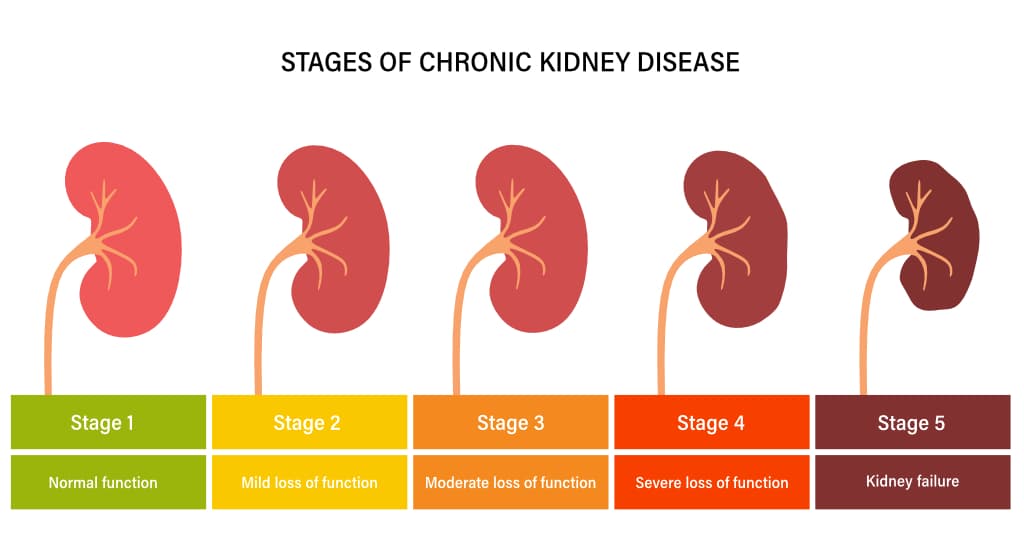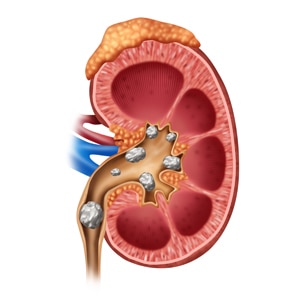Kidney Problems
Published (updated: ).
Kidney (Renal) Failure

The kidneys, each just the size of a computer mouse, filter all the blood in the body every 30 minutes. They work hard to remove wastes, toxins, and excess fluid. They also help control blood pressure, stimulate production of red blood cells, keep bones healthy, and regulate blood chemicals that are essential to life.
Kidneys that function properly are critical for maintaining good health, however, more than one in seven American adults are estimated to have chronic kidney disease.
About Chronic Kidney Disease
Chronic renal disease is a condition in which the kidneys are damaged and cannot filter blood as well as they should. Because of this, excess fluid and waste from blood remain in the body and may cause other health problems, such as heart disease and stroke.
15% of US adults are estimated to have chronic kidney disease, that is about 37 million people. Some other health consequences of CKD include:
- Anemia or low number of red blood cells
- Increased occurrence of infections
- Low calcium levels, high potassium levels, and high phosphorus levels in the blood
- Loss of appetite or eating less
- Depression or lower quality of life
Chronic kidney disease has varying levels of seriousness. It usually gets worse over time though treatment has been shown to slow progression. If left untreated, chronic kidney disease can progress to kidney failure and early cardiovascular disease. When the kidneys stop working, dialysis or kidney transplant is needed for survival. Kidney failure treated with dialysis or kidney transplant is called end-stage renal disease (ESRD). Not all patients with kidney disease progress to kidney failure.
Chronic kidney disease by the Numbers
- Kidney diseases are a leading cause of death in the United States.
- About 37 million US adults are estimated to have CKD, and most are undiagnosed.
- 40% of people with severely reduced kidney function (not on dialysis) are not aware of having CKD.
- Every 24 hours, 360 people begin dialysis treatment for kidney failure.
- In the United States, diabetes and high blood pressure are the leading causes of kidney failure, accounting for 3 out of 4 new cases.
- In 2019, treating Medicare beneficiaries with CKD cost $87.2 billion, and treating people with ESRD cost an additional $37.3 billion.
Risk Factors
- Diabetes
- High blood pressure
- Heart disease
- Family history of CKD
- Obesity
Symptoms
People with chronic kidney disease may not feel ill or notice any symptoms. The only way to find out for sure if the patient has chronic kidney disease is through specific blood and urine tests. These tests include measurement of both the creatinine level in the blood and protein in the urine.
Quick Facts: Chronic kidney disease Snapshot
- Kidney diseases are a leading cause of death in the United States.
- Early CKD has no signs or symptoms.
- Specific blood and urine tests are needed to check for CKD.
- CKD tends to get worse over time.
- CKD can be treated (the earlier treatment starts the better).
- CKD can progress to kidney failure.
Kidney Stones
A kidney stone is a solid, pebble-like piece of material that can form in one or both kidneys when high levels of certain minerals are in the urine. Kidney stones rarely cause permanent damage if treated by a physician.

Patients who have a kidney stone may feel a sharp pain in the back, side, lower abdomen, or groin; or have blood in the urine. If stone is small, it may easily pass through the urinary tract and the patient may not have symptoms at all. A physician will use medical history, a physical exam, and tests to diagnose kidney stones. The tests may also be able to show problems that caused a kidney stone to form. A physician may treat kidney stones by removing the kidney stone or breaking it into small pieces with ultrasound shock waves.
